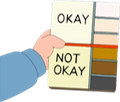Marhaba ![]() about 3 years ago I made a similar post and ended up teaching a comrade for almost 2 years, and I loved teaching my native tongue so I wanna go on that journey again, especially now that I have so much experience and already made the “course material”, it’s a fun “side hustle”.
about 3 years ago I made a similar post and ended up teaching a comrade for almost 2 years, and I loved teaching my native tongue so I wanna go on that journey again, especially now that I have so much experience and already made the “course material”, it’s a fun “side hustle”.
Ofc I make sure to adapt the lessons and study plan to the student’s interests and pace. I try to incorporate Comprehensible Input as much as possible even though it’s very scarce to find input made for learners. I think language learning has to be fun, engaging and things need to make sense, and believe me Arabic makes a lot of sense unlike English.
You can dm me from a throwaway account if you want. Let me know if you have any questions about Arabic or my approach to teaching. And dw about money, really!
And if there is enough interest we can have group lessons as well... just let me know if you're interested and we can try to make it work ت
Arabic is nowhere near as intimidating as you think, it actually has internal logic and consistency
I'm just gonna quote what @prolepylene said about his experience learning Arabic
Learning languages is hard, but I find it very rewarding. My lessons are fun, the language itself makes sense in a way that allows me to infer meanings and uses I don't explicitly know, and it teaches me about English almost as much as Arabic. Arabic as a language makes a lot more sense than English. A big part of it is that Arabic isn’t a bastard language of Germanic and Romantic influences, though the history of the Arabic world has left it with many loan words from the west. The other big thing is MSA (Modern Standara Arabic), though not really spoken colloquially, is actively managed to make it universal and easy to learn. In my opinion, the script is the least intimidating part of the language.
The [Arabic root system] is pretty great. At first I wasn’t sure how it was substantially different from the Latin root system, but comparatively to English the Arabic root system is everywhere throughout the language. As you learn the forms and patterns you can break down basically all verbs, nouns, adjectives, and adverbs to a base form and a pattern that you can use to infer meaning.
Do I want to know why to not use Duolingo
Hi, I am a linguist who studies how people learn languages. Duolingo isn't terrible, but there are better uses for your time.
Here are some reasons:
As others in this thread have pointed out, it's also much better for Western languages with the Latin alphabet. Duo started with Spanish and French, and I've heard through contacts that work there, French is their archetypal/flagship course. The computer scientist-oriented solution for expanding to other languages is to assume typological similarity between languages, which means languages that are farther from French in grammar, writing system, etc. will all be contorted to fit the shape of their system.
My suggestions for anyone looking to learn a new language:
I could literally go on for days. Happy to answer specific questions anyone has.
I'm feeling 50% chance it's shit 50% chance just because its a normal shitty company and doesn't work
shit 50% chance just because its a normal shitty company and doesn't work
edit: even natopedia has this very conspicuous
So it kinda feels like theres not much evidence for its effectiveness and I bet the example data is a lot better for some languages than others...

Their move into AI generated lessons is a bit worrying IMHO
First time I hear of this shit, how do these tech companies manage to keep getting worse
Their audacity to just ruin shit is wild
I'm sure investors eat it up though
Duolingo is a fine practice aid for Western European languages but most other languages are extremely underdeveloped. I've taken a stab at Duolingo Arabic and found it to be next to useless.
like in my experience there's a clear tier ranking.
Your odds are dramatically worse if it's in a non-Latin script.
Ive been using it- you’ll be very slow out the gate. I’ve had almost 100 days and it’s still on very basic phrases, like, still no verbs!. I’m using it as a warm-up before I dust off some of my old textbooks. It also doesn’t really teach the alphabet in a systematic way. What I do appreciate is the listening practice to differentiate the regular/ emphatic consonants which I find one of the more difficult parts of the language.
In addition to the reasons stated above, it’s also not ideal from a purely utilitarian point of view. Duolingo is very good at making you feel like you are learning a language, and gamifying that experience. If you watch people with 4 year streaks actually speak their target language it’s worryingly bad (in my experience). You would have gotten much further with other approaches.
My personal recommendation from learning French is to use Clozemaster for vocabulary and then as quickly as possible switch to emersion. Find simple books or tv shows that you can just about follow and increase complexity with skill.
Everyone learns languages in a different way so most importantly find something that works for you of course. But from learning German and French this was most effective for me.
ps: Yes I’m learning all the boring eurocentric languages but coming from The Netherlands they are simply the most useful for me.
This is quite demoralizing.
In what sense?
Learners probably end up losing interest because of the very slow progress.
deleted by creator